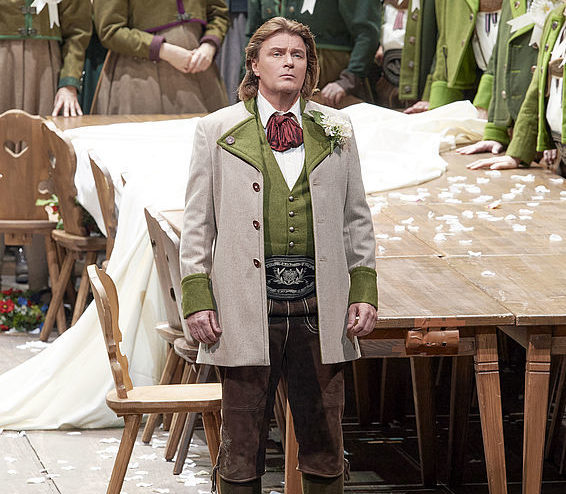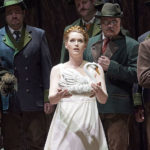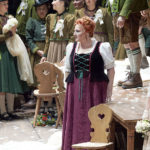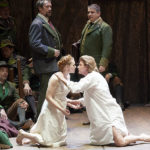 Hard to believe that Valery Gergiev only rarely conducts at Vienna State Opera, tonight’s, Wagner’s Lohengrin, his second visit after Parsifal. From the Prelude, Gergiev’s conducting mesmerised Vienna State Opera orchestra with passion: unequaled since Welser-Most and Thieleman. Yet Gergiev, this magician, is modestly dressed in a black smock, a figure without flamboyance, his conducting measured.
Hard to believe that Valery Gergiev only rarely conducts at Vienna State Opera, tonight’s, Wagner’s Lohengrin, his second visit after Parsifal. From the Prelude, Gergiev’s conducting mesmerised Vienna State Opera orchestra with passion: unequaled since Welser-Most and Thieleman. Yet Gergiev, this magician, is modestly dressed in a black smock, a figure without flamboyance, his conducting measured.
When this production (Wolfgang Gussman), premiered 2016, it didn’t impress me, with its rather claustrophobic oak-effect hall, and minimalist concept (the miniature white swan). In the first Act, the stage is packed with no less than two choirs, (Vienna State Opera’s with an extra choir), for King Heinrich’s visit to Brabant to settle the succession dispute. Elsa, daughter of the deceased Duke, is accused by Telramund of murdering her brother Gottfried. This cast excels with experienced Wagner singers, including Ain Anger’s bass as the King, and an outstanding Telramund in bass-baritone Egils Silins.
The opening is dominated by the people’s mass choirs, Telramund’s accusations backed by his scheming wife. Ortrud, sung by magnificent dramatic soprano Linda Watson, is herself implicated in Gottfried’s disappearance, to restore her family’s claims. Elsa is challenged to respond to accusations of fratricide. The gossipy voices of the people’s choirs -dressed in traditional German ‘tracht’ folk outfits- are menacingly relentless.
As Elsa, Cornelia Beskow, the Swedish soprano, stepped in for Camilla Nylund, who’s regularly sung the role. Beskow, blonde, slight physically, looks vulnerable, and fits the part of a young woman. Her lyrical soprano has a classical purity- Elsa’s an innocent in plot’s intrigues- but she’s capable of confident high notes. She sings, to the gathered ranks of burly Germans, of a dream in which a knight appeared to her, offering to defend her. 
A trial of combat is proclaimed by the King, at first there are no champions to fight her cause (against Telramund.) The assembled people become increasingly restive and contemptuous. Elsa, isolated, bullied, Beskow really enacts the part; the tension becomes unbearable. Until a small basket- we can hardly see it- surrounded by surging crowds; supposedly drawn by a swan, here a table size, porcelain model, held high.
Klaus Florian Vogt, as the eponymous Lohengrin, the stand-out success in the premier’s performances, replaced Piotr Beczala, who cancelled at short notice. Vogt really looks the part, blonde, like a cavalier, with long, shoulder-length hair, facially, cherubic innocent, his lyrical tenor descended from some heavenly kingdom. In fact, no spoiler, what you’d expect a Knight of the Holy Grail to look like. Uncannily handsome. He sings, offering Elsa protection, then marriage: the simple condition that she never asks his name or where he comes from.
The tables are organised for the joust, which looks realistically fierce, with Silins’ Telramund, armed with a knife, actually falling off the table, wounded onto his shoulder (Werner Hintze’s staging ). In the chivalric code, his defeat in combat proves Elsa’s innocence.
But for me the real drama, and operatic highlights, were in the second Act, with Ortrude’s reproaching Telramund. Huddled in a corner, they’re hiding in shame behind the upturned furniture of the combat. Linda Watson’s Ortrude reminds of Lady Macbeth, goading her lily-livered husband on to fight. He’s fraught with self-doubt, questioning her scheming. She, Otrude, commands, urging him on, using her womanly skills to get her way.
Telramund defeated, Ortrude, humiliated, seeks revenge. ‘Outlawed! My father’s House, cursed.’ But, she vows, her ancient family will flourish again. Watson, red-haired, in a white smock, formidable, overcomes her principled husband’s resistance. ‘Would you threaten me, a woman. Coward! Give me the power, and I’ll show you the weakness of your God.’ Her visionary eyes will inspire him. Not for nothing is she versed in ‘the dark arts’. The knight will be revealed as powerless. Be calm, she’ll teach him, Telramund, the sweet arts of revenge. Watson draws Silins’ to her in a passionate kiss, then withdraws her body. Let worms of revenge crawl from her breast! Watson’s soprano incandescent, this is Wagner singing of the highest order.
Now Ortrude wins Elsa’s confidence, to sow doubt about her mysterious knight. Elsa gives thanks for her new happiness. Naively asks Ortrude, why can’t she understand ‘the blessing of trust’? (But Ortrude secretly curses,’the man who destroyed his honour must die!’) While Ortrude invokes Wotan’s revenge, Elsa begs her forgiveness. It’s the battle between good – Christian ideals represented by the Holy Grail – against Ortrude’s dark forces.
In the spectacular chorus, the men in traditional green-and-brown suits, wearing ‘alpine’ felt hats- lusty, full-bodied singing in the German choral tradition. Ladies-in-waiting now charmingly make place for Elsa, in white lace, presented with a bouquet. On the day of the wedding, Elsa walks to the altar with the ‘Knight’.  Ortrude disputes her ‘precedence’, as Elsa cannot utter the name of her future husband. Watson, in purple, arrogantly bestrides the white banqueting table, raging about the ‘false trial’, and her outlawed husband. Ortrude mocks Elsa’s ‘wily knight’- Can you name him, give us his lineage ; he forbade the question.’ Elsa counters, you blaspheme: he who doubts will suffer endless torment.
Ortrude disputes her ‘precedence’, as Elsa cannot utter the name of her future husband. Watson, in purple, arrogantly bestrides the white banqueting table, raging about the ‘false trial’, and her outlawed husband. Ortrude mocks Elsa’s ‘wily knight’- Can you name him, give us his lineage ; he forbade the question.’ Elsa counters, you blaspheme: he who doubts will suffer endless torment.
The Knight reappears, Vogt fabulous, angelic, golden-haired, from a medieval order. Telramund accuses him of ‘sorcery’, while the Chorus observe ‘doubt in her simmering breast’. Elsa insists, betraying his secret would jeopardise him; he sings,’my love will soar above doubt.’
The Lohengrin Prelude to Act 3, heard countless times in concert, has rarely been played with such vigour and passion. In their scene after the wedding, they’re facing each other alone for the first time. Beskow’s soprano embodies the innocent, joyous Elsa with vibrato-less purity. Vogt, lyrical, like a mature chorister, sings, ‘her perfume delighted him; he was impressed by her innocence, though accused of a heinous crime.’
Elsa is tormented by doubts. She persistently tries to ask, where do you come from? His voice soars, repulsing her question; will say nothing. He demands absolute trust. It’s a test of true love, the foundation of marriage. His Knight is incorruptible: he sings, if the King offered his crown, he’d refuse it. So put doubts aside, for I come from a place of radiant joy. 
Now she sings filled with sadness. She, a mere woman, fears being forsaken, abandoned. Whereas he’s all about an insurmountable act of faith. It cannot work. Marriages are of this earth. Beskow’s Elsa is a dramatic performance- harrowing, desperate. Have mercy on me, she sings.
The soldiers gather for battle, but the unknown knight cannot lead. His is a spiritual mission. (He had struck a man trying to attack him, Telramund.) His wife was ‘misled into betraying him’. Elsa lies apparently lifeless, front-of-stage, Beskow, her plaited gold hair, doll-like. Vogt is now forced to reveal his secret.- She, kneeling, stares at him. Vogt has us spellbound, singing of the Grail, and those who serve it. All evil powerless against them. They ‘do not lose their divinity so long as their identity is hidden.’ My father Parsifal wears its crown. ICH BIN LOHENGRIN!
So, identity blown, he must leave Elsa and Brabant. He had rescued Elsa -damsel in distress. She, his as a non-returning sacrifice, had feared losing him. Heartrending, she calls to him, pleading; he throws her to the floor. But breaks Ortrude’s spell on Elsa’s brother; a human form emerges, the swan metamorphosed (that porcelain symbol.)
Sublime hokum. But we won’t hear better for a long time. Wagner seldom better played, the orchestra was on fire, Vienna’s players exceeding even their best. Thrilling! Surely Gergiev will be invited back, when he’s got the time. © PR. 9.1.2020
Photos: Klaus Florian Vogt (Lohengrin); Cornelia Beskow (Elsa of Brabant); Ortrud (Linda Watson); Klaus Florian Vogt and Cornelia Beskow
© Wiener Staatsoper / Michael Pöhn
